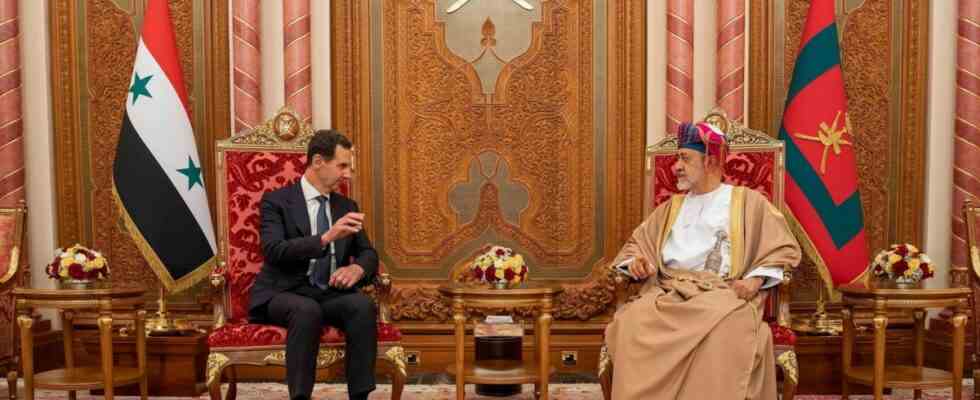The red carpet is rolled out again for him: Bashar al-Assad, the Syrian dictator who led and still leads a massive campaign of annihilation against his own people. The London-trained ophthalmologist, who has ruled the country for almost 23 years, has hardly missed a war crime: from the bombing of hospitals and schools to years of sieges of entire cities and the mass murder of prisoners.
The brutal actions of the Assad regime are said to have cost the lives of around 500,000 Syrians and forced 13 million people to flee, six million of them inside the country. Assad has been charged with crimes against humanity, including the use of chemical weapons. And now, after the devastating earthquake in northwestern Syria, the red carpet is being rolled out again for this very Assad — at least in Muscat in the Sultanate of Oman, which has a reputation as a neutral mediator in the region. Other countries could follow the example.
“There is a consensus in the Arab world that the status quo is not working and we need to find a different approach, which is still being formulated,” said Saudi Foreign Minister Prince Faisal bin Farhan bin Abdullah al-Saud as part of the Munich Security Conference last weekend. He also mentioned the economic overload of countries like Lebanon or Jordan when it comes to caring for Syrian refugees. One must speak with Assad about repatriations, said the minister.
A rapprochement should also reduce Tehran’s influence in Syria
These are new sounds from the Kingdom of Saudi Arabia that make you sit up and take notice, because the Saudi position in dealing with Syria is considered decisive for the re-admission to the Arab community. So far, it has primarily been the Saudis and the Qataris who have blocked an initiative to reinstate Syria in the Arab League. As early as 2021, Cairo said it wanted to “bring Syria back into the bosom of the Arabs”.
States such as Saudi Arabia or the United Arab Emirates (UAE) also hope that a possible rapprochement with Damascus will reduce Iranian influence in Syria. Besides Russia, Bashar al-Assad is supported by the regime in Tehran. The two regional powers and archenemies Saudi Arabia and Iran are fighting for power and influence. With the earthquake aid for the suffering Syrians, the government in Riyadh would have an excuse to further normalize relations with Damascus. Saudi planes carrying food, medicine and tents landed in the Assad-held city of Aleppo in the past few days, for the first time since the Syrian revolution broke out in 2011. Assad now controls two-thirds of the country again.
The calculation could work out for Bashar al-Assad, the 57-year-old is trying to end his international isolation and lift the sanctions in view of the urgently needed help. The US has already eased sanctions for 180 days to ease earthquake relief efforts. And Assad also seems to be succeeding in the former, at least regionally: Egyptian President Abdel Fattah al-Sisi phoned the Syrian ruler for the first time last week and promised help. Visited a few days ago Jordanian Foreign Minister Ayman Safadi for the first time since the outbreak of the Damascus conflict. After all, Jordan’s King Abdullah II was the first Arab head of state to call for Assad’s resignation in 2011.
So the earthquake offers Assad the opportunity to force the international community to give him official recognition. Giorgio Cafiero, CEO of Washington-based risk analysis firm Gulf State Analytics, speaks on Twitter of “earthquake diplomacy”, which came as no surprise. The United Arab Emirates have been insisting on a rapprochement with Damascus for years and were the first to initiate diplomatic steps. In December 2018, the UAE reopened its embassy in Damascus. In 2021, the Emirati Foreign Minister Sheikh Abdullah bin Zayed al-Nahyan visited Damascus and in 2022 Assad traveled to an Arab country for the first time since the beginning of the war, to the United Arab Emirates, where he was warmly welcomed.
The Qataris have so far been considered loud critics and advocates of continuing to ostracize Assad. Judging by the latest statement by the Saudi foreign minister, you could now be pretty much on your own. In mid-January, Sheikh Mohammed bin Zayed al-Nahyan, the influential President of the United Arab Emirates, invited the leaders of Oman, Qatar, Egypt, Jordan and Bahrain to discuss “prosperity and stability in the region”. It should also have been about dealing with Syria.
Andreas Krieg, a golf expert from London’s King’s College, described Assad’s current visit to Oman as a result of this Abu Dhabi summit. Only Qatar vehemently opposed the push for normalization with Syria, writes war. So it could only be a matter of time before another Arab country rolls out the red carpet for Assad.

